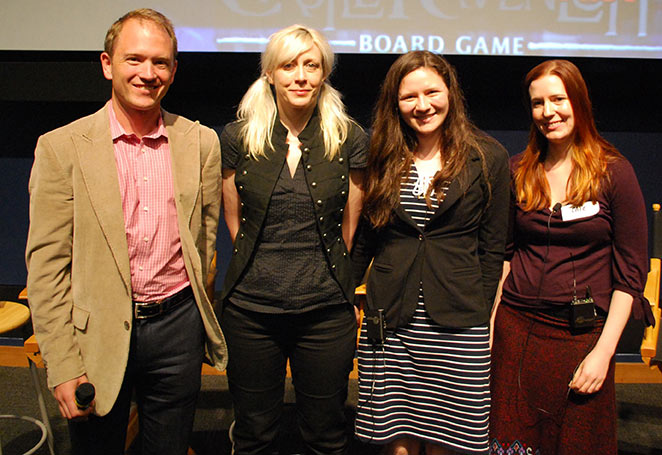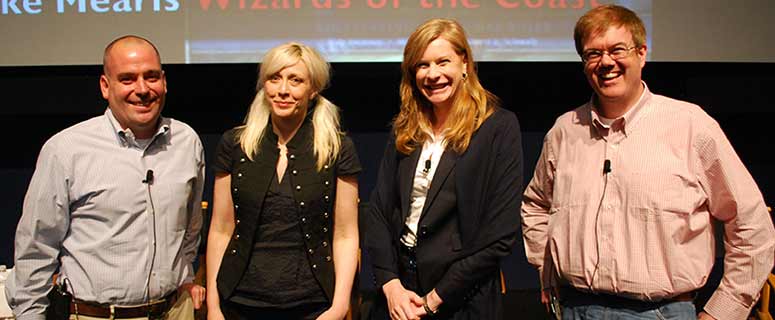Gaming, whether it’s practiced on a computer, phone, or traditional board, is a growing, robust business. By some accounts the global market is worth about $67 billion and its profits are higher than the film industry’s. And Dartmouth alumni are right in the thick of it.
“Dartmouth offers a fantastically creative environment for gamers to interact, and an unusual number of Dartmouth graduates go on to the field of gaming,” said professor Mary Flanagan, the founder of the Tiltfactor game design lab, as she opened the second annual “Dartmouth at Play” conference on May 17.
Flanagan, the Sherman Fairchild Professor of Digital Humanities, introduced six alumni connected to businesses and games such as Disney, Hasbro, Dungeons and Dragons, Microsoft’s X-Box, The Presidential game, and World of Warcraft. The alumni spoke candidly and humorously for about two hours with undergraduates in Loew Auditorium on the Friday afternoon of Green Key weekend.

Engaged students asked questions on topics, such as what makes a game good versus great; how the masterminds behind beloved games go about making changes (the answer is very carefully); and how the Internet has transformed gaming.
Justin Kreter ’03Tu, a director of global strategy and marketing at Hasbro, talked about how a social media campaign to pick a new Monopoly character helped ignite interest in the iconic board game. “There was a tremendous response, and we found that people cared a lot about the pieces,” said Kreter, who helped lead the campaign. (A cat piece was selected.)
The alumni on the panel emphasized their role as storytellers, as concerned with tapping in to their audience’s imaginations and emotions as they are with the game itself. “Today games are more like films, or novels,” said Mike Mearls ’97, head of research and development for Dungeons and Dragons. “There should be an intrinsic reward that drives you to participate.”

Writer for Blizzard Entertainment Cate Gary ’02 noted that her company employs two full-time historians to help ensure the accuracy of their World of Warcraft narratives. “There is fairly complex character development, and we painstakingly manage the plot,” she said. The emphasis on story is a relatively new development, said Gabriel Schlumberger ’96, director of digital creative for Disney Publishing Worldwide. “When I was young the stories were pretty thin,” he said. “Now, the game has to work flawlessly, and it has to be engaging—but the bar is so much higher to also have a strong story.”
Alumni also discussed the origin of their interest in gaming. Schlumberger said his family didn’t own a television, but he and his sister played Monopoly “endlessly,” and they later competed on Nintendo games. Mearls said, “When I asked my parents where their 20-sided die was they knew my interests were different.” Linden Vongsathorn ’10, a software developer for Microsoft’s X-Box team, said, “My brother was always playing when I was young, but I told him what to do.”
Regina Glocker ’88 stood out among the panelists for developing an entirely new game—The Presidential, a board game that reflects people’s interest in presidential races and elections. Without the resources of larger companies, Glocker said, “We started with just a few people. But we tapped into the Dartmouth network, and that was just instrumental in making this happen.”
